"Russian Richelieu". Metropolitan Alexy, regent and de facto ruler of the Moscow principality
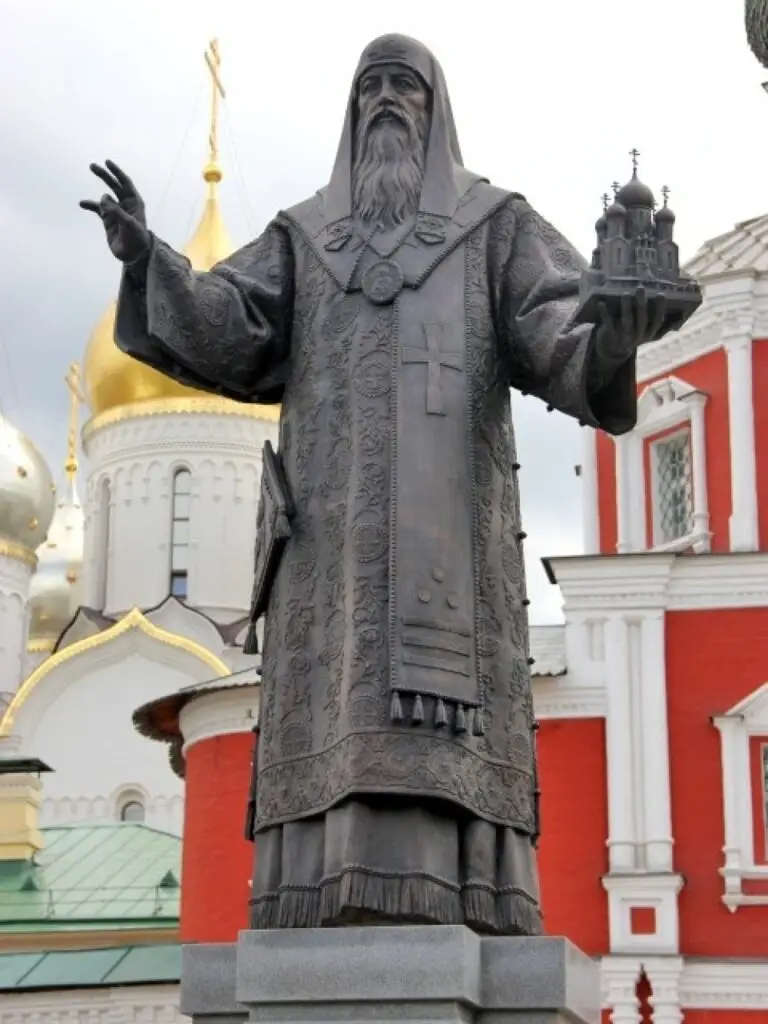
Monument to Saint Alexy in the Conception Stavropegic Convent of Moscow
В previous article we talked about the origins of Metropolitan Alexy, how he became Metropolitan of Kyiv and All Rus', his famous trip to the Horde, where he healed Khansha Taidula, and then “calmed down” Khan Berdibek. Today we will continue this story.
Regent of the Moscow Principality
In November 1359, the Grand Duke of Moscow Ivan the Red died. His son and heir Dmitry was only 9 years old at that time, and the boy could not boast of a good education; in one of the chronicles you can read:
His contemporaries and rivals - Oleg Ryazansky, Dmitry Suzdalsky, Olgerd of Lithuania, were much more “scientific” people.
Metropolitan Alexy then inopportunely found himself captured in Kyiv - in January of that year he was captured by order of Olgerd. But, returning to Moscow in 1360, Alexy pushed aside the other guardians, imperiously taking all matters into his own hands. It was from that time that it became customary to seal interstate agreements with the metropolitan seal.
The Velyaminovs also played a major role then. The eldest of them, Vasily Vasilyevich, was a thousand, his son Mikula married the sister of the Grand Duke’s wife. One of Vasily’s brothers, Fyodor Voronets, was a boyar, the other, Timofey, was a okolnichy.
It must be said that young Dmitry was then much luckier than Ivan IV, who until the end of his life remembered the oppression and humiliation he suffered after the death of his mother. Metropolitan Alexy not only took care of the orphan, but, being the Metropolitan of Kyiv and All Rus', he put the Church he headed at the service of the Moscow Principality.
The Grand Duke of Lithuania Olgerd wrote about Alexy in Constantinople in 1371:
Less fortunate was Dmitry’s rival, Prince Oleg of Ryazan, who ascended the throne in 1350 at the age of about 12 and did not have such an excellent guardian as Metropolitan Alexy. He had to immediately grow up and take care of the affairs of his principality. In 1353, Oleg recaptured Lopasnya, which had been captured by Muscovites in 1300, from Ivan the Red (father of Dmitry Donskoy) - being at that time, according to the Moscow chronicler:
Well, what other characteristics can you expect from the Moscow ill-wishers of this prince?
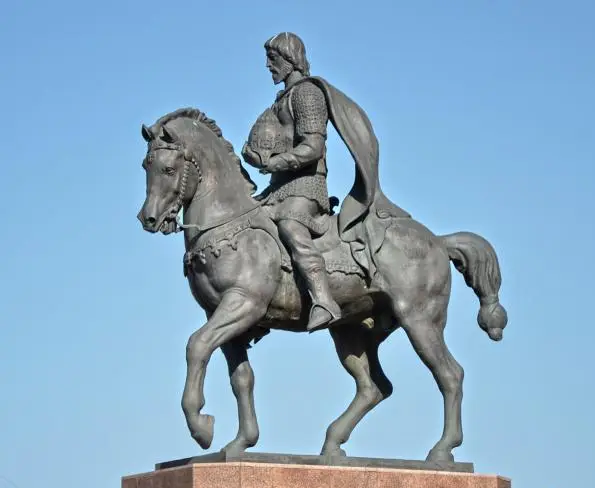
Prince Oleg, monument on Cathedral Square in Ryazan
Just two years later, in 1355, the “young-minded” Oleg took control of Murom. In the Moscow chronicles of Oleg's time, the princes of Pronsky, Kozelsky, Tarussky and Novoselsky are also called “Ryazan” (that is, subordinates of Ryazan). The small principality of Yelets was also on friendly terms with Ryazan at that time.
But let's return to Moscow.
In 1362, although with difficulty, Alexy managed to achieve the return of 12-year-old Dmitry's label for the Great Reign, which for some time was transferred to the Suzdal prince Dmitry Konstantinovich. Moreover, since the Horde was going through the period of the Great Rebellion, the labels were received from two khans at once - from the “King of the Mamaev Horde” Avdul and the “King of the Sarai Horde” Amurat.
The appeal to Avdul aroused the anger of Amurat, who in 1363 transferred the label to the Great Reign to Dmitry of Suzdal. Alexy sent an army against Suzdal under the nominal command of his ward, Dmitry, achieving peace “according to the entire will of Moscow.”
In 1362, Alexy managed to come to an agreement with Olgerd, and until 1368, relations between Moscow and the Grand Duchy of Lithuania were completely peaceful. In the summer of 1363, Alexy even baptized in Tver one of the daughters of the pagan Olgerd of Lithuania, whom the Polish historian J. Tengovsky identifies with the future wife of the Grand Duke of Ryazan Oleg Ivanovich - Euphrosyne.
In 1364, power in the Horde changed, Dmitry Konstantinovich of Suzdal received a label for the Great Reign from the new khan - and chose to abandon it in favor of the Moscow prince.
The fact is that then the elder brother of the Suzdal prince, Andrei Konstantinovich Nizhny Novgorod, died. And the youngest of the brothers, Boris, seized power in Nizhny Novgorod. In exchange for help against him, Dmitry Konstantinovich handed over the label for the great reign to Moscow.
Metropolitan Alexy offered the brothers the mediation of Sergius of Radonezh, who had the highest moral authority, who, after Boris refused to appear “for trial” in Moscow, “closed” the Nizhny Novgorod churches and forbade holding church services.
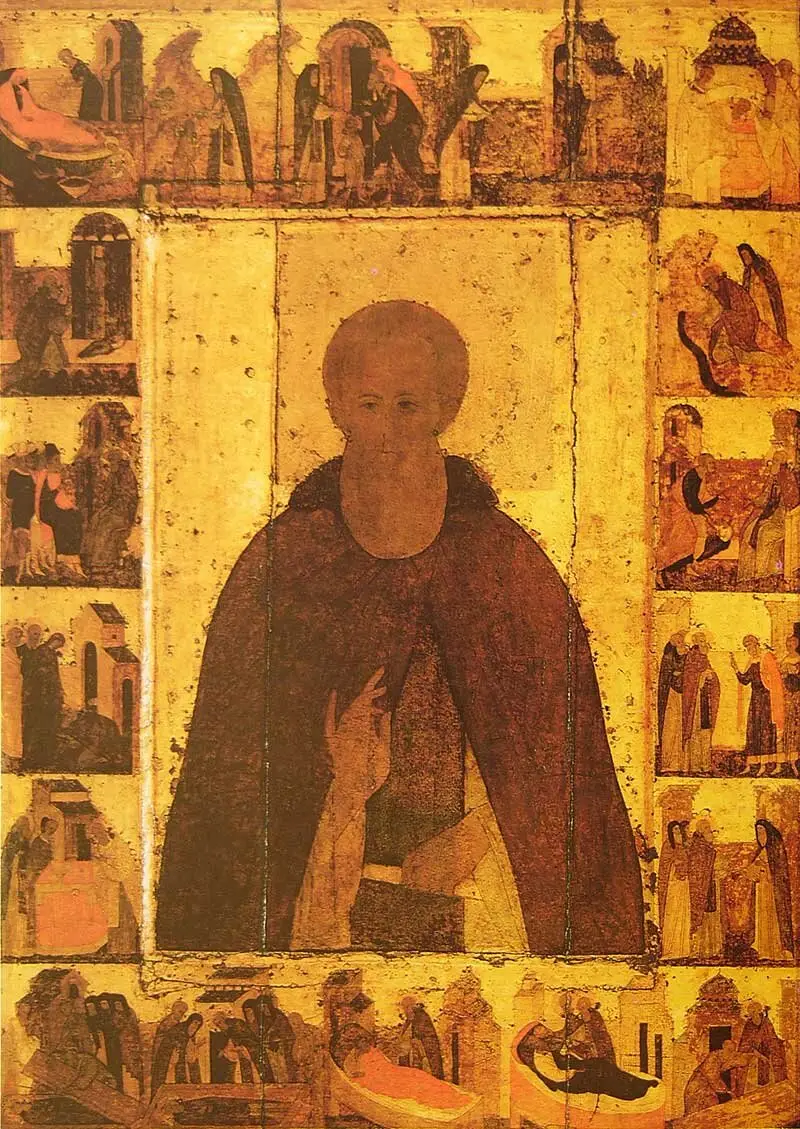
Hagiographic icon of St. Sergius of Radonezh, late 15th century
We often read that this was enough to “reason” with Boris. In fact, he decided that services in churches were not vital, and he changed his mind only after seeing the Moscow army sent there by Alexy in front of the city walls. Only after this did he agree to give in to his brother and move to Gorodets.
And Dmitry Konstantinovich, who became the Grand Duke of Suzdal-Nizhny Novgorod, in January 1366 married his youngest daughter Evdokia to Dmitry of Moscow. Thus, Alexy’s peacekeeping mission was not at all disinterested, and he acted exclusively in the interests of Moscow.
Then, “with the blessing” of Alexy, an agreement beneficial to Dmitry of Moscow was concluded with his cousin Vladimir Andreevich Serpukhovsky. Later, on the advice of the Metropolitan, in order to preserve this alliance, Dmitry ceded Borovsk and the lands along the Luzha River to the Serpukhov prince.
In 1367, the construction of a stone Kremlin began in Moscow: the length of the walls was then about two kilometers, there were, according to various sources, from eight to nine towers, six of them were travel towers. This Kremlin was then never able to take Olgerd, who approached Moscow twice.
In the same 1367, the Grand Duke of Tver Mikhail Alexandrovich and the appanage Tver princes turned to Alexy to resolve the dispute. Please note: in this case, the parties actually recognized the powers of the Horde khans for the hero of the article - it was to them that the Russian princes traditionally turned with such questions.
However, very soon Mikhail Tverskoy became convinced that Metropolitan Alexy of Kiev and All Rus' was in fact the Metropolitan of Moscow and only Moscow; all other princes should not expect honesty and objectivity from him. In mid-1368, having received security guarantees from Alexy, Mikhail Tverskoy came to Moscow for negotiations - and was arrested along with the boyars accompanying him.
Perhaps, of course, this was the willfulness of the young (18-year-old) Moscow prince trying to assert himself, but, in any case, it was Alexy who formally broke his word. The Tverichs were released due to the arrival of the embassy from the Horde, and then, together with the Smolensk people, they took part in Olgerd’s first campaign against Moscow.
As a result, Mikhail Alexandrovich Tverskoy and Svyatoslav Ivanovich Smolensky were excommunicated by Alexy from the Church.
The war with the Grand Duchy of Lithuania lasted until 1372 and ended with the conclusion of an agreement, according to which Olgerd promised not to interfere in the conflict between Moscow and Tver. But Mikhail Tverskoy still managed to get a label in the “Mamaeva Horde” from Mamat-Saltan.
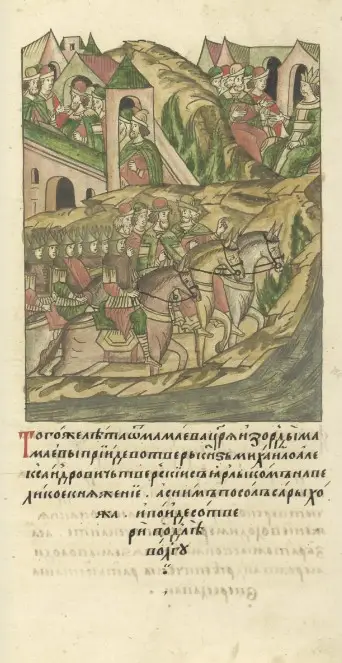
Mamai presents the label for the great reign to the Tver prince Mikhail Alexandrovich. Miniature from the Facial Chronicle vault
However, in the end it only turned out worse: Moscow troops blocked the path of the Tver prince returning from the Horde, and his son the following year was “ransomed” in the Horde by Dmitry and brought to Moscow.
This prince was released only in 1375, when his father recognized the seniority of the Prince of Moscow, renouncing an alliance with Lithuania and claims to a great reign. That year, Tver was almost taken by the united army of Russian princes. The “Final Letter” states that the Grand Duke of Ryazan Oleg Ivanovich became the arbitrator in controversial cases between Dmitry Moskovsky and Mikhail Tversky.
Death of Metropolitan Alexy
Alexy's pro-Moscow policy did not suit the Grand Duke of Lithuania Olgerd at all, who openly threatened the Patriarchs of Constantinople with the conversion of his subjects to Catholicism. In 1375, Patriarch Philotheus Kokkin appointed his cell attendant and apocrisiary (diplomatic position) Cyprian, a native of the Bulgarian Velikiy Tarnovo, as Metropolitan of Minor Rus' and Lithuania. To the horror of Muscovites, the “Lithuanian” Metropolitan Cyprian was declared the “heir” of Alexy to the Metropolis of All Rus', and Kyiv became his place of residence.
Meanwhile, on February 12, 1378, having lived about eighty years, Metropolitan Alexy died in Moscow. He wanted to be buried near the cathedral church of the Annunciation of the Chudov Monastery, but Prince Dmitry ordered to bury him in the temple - at the altar. After 50 years, he was canonized and began to be revered among the Moscow saints.
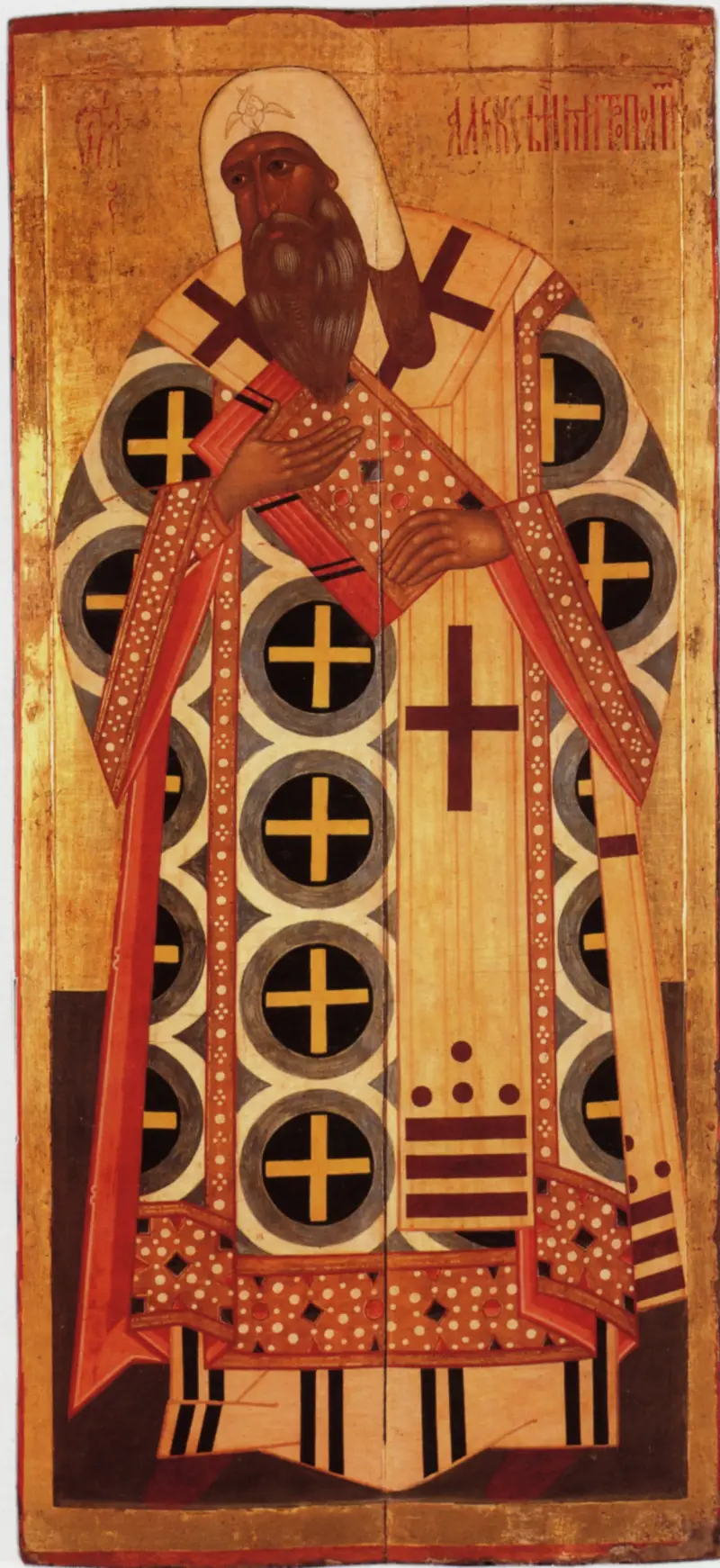
“Alexy, Metropolitan of Moscow”, icon from the Deesis rite of the Solvychegodsk Annunciation Cathedral, 16th century.
In the handwritten life of Alexy, which was kept in the library of the Chudov Monastery, there were records of 18 miracles that took place at his relics at different times: the healing of a madman, a “paralytic”, two blind people, wounded by an arrow, and so on. This fragment of the icon “Metropolitan Alexy with the Life” depicts “the resurrection of the baby at the tomb of Alexy”:
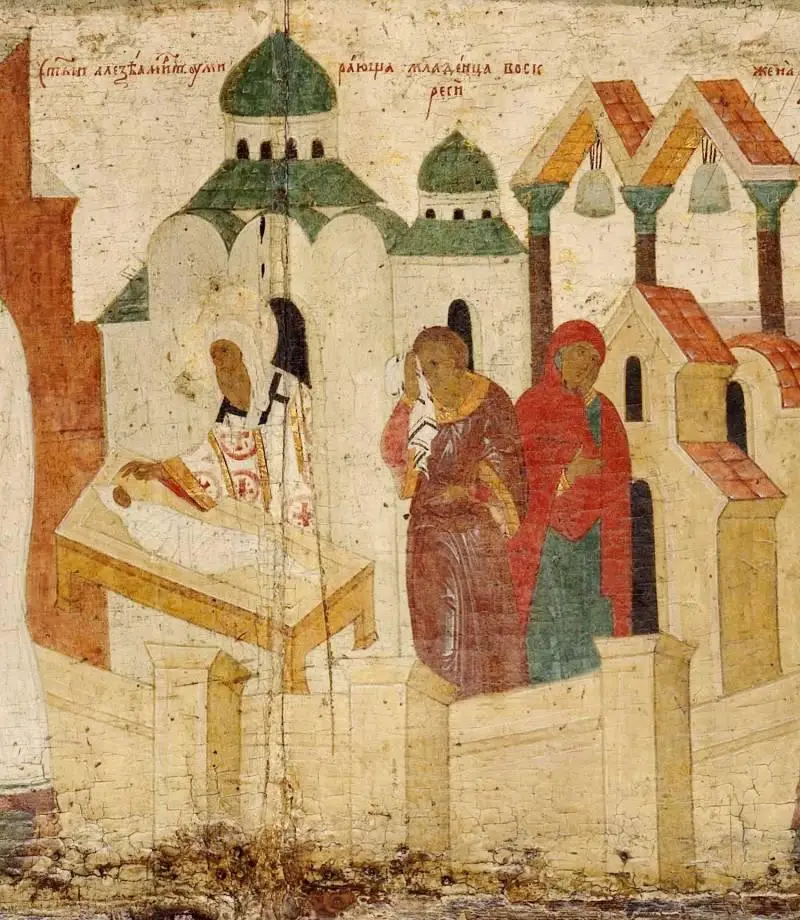
In 1929, a decision was made to demolish the monastery; the icons and fragments of frescoes were transferred to the Kremlin museums. The relics of Alexy were also preserved, which were returned to the Church in 1947. Now they are in the Elokhovsky Epiphany Cathedral in Moscow - to the right of the altar.
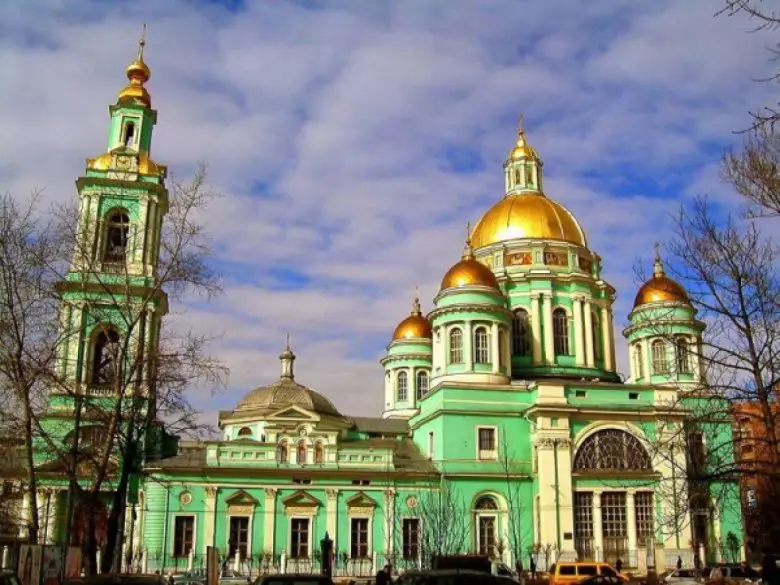
Epiphany Cathedral in Elokhov, 1938–1991. it was the patriarchal council of the Russian Orthodox Church
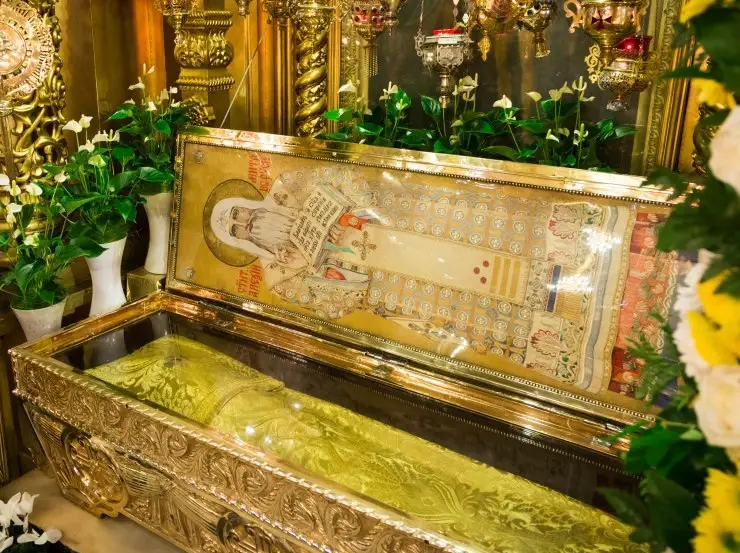
Relics of Saint Alexy
It is believed that the intercession of Saint Alexy helps those praying for healing from eye diseases, as well as for protection from evil people and reconciliation between warring people.
The figure of Metropolitan Alexy can also be seen on the “Millennium of Russia” monument in Veliky Novgorod (in the group of “enlighteners”):
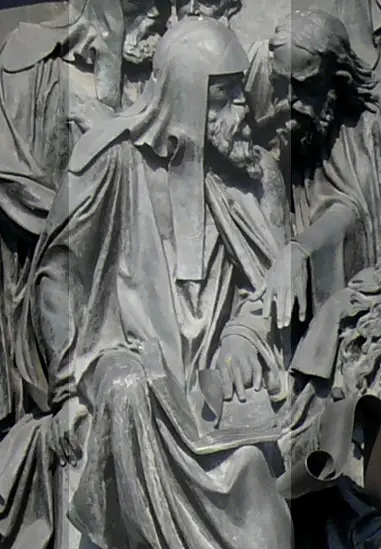
There are about 250 churches and chapels in honor of St. Alexis of Moscow. In addition, the Orthodox Volga Region Academy of Education and Arts, opened in Tolyatti in 2013, bears his name. In Moscow, on Leninsky Prospekt, there is the Central Clinical Hospital of St. Alexis with 280 beds - the only medical institution of the Russian Orthodox Church. This hospital was opened in 1903 with funds from the merchants Medvednikovs and Rakhmanovs, as a kind of hospice for incurable patients.
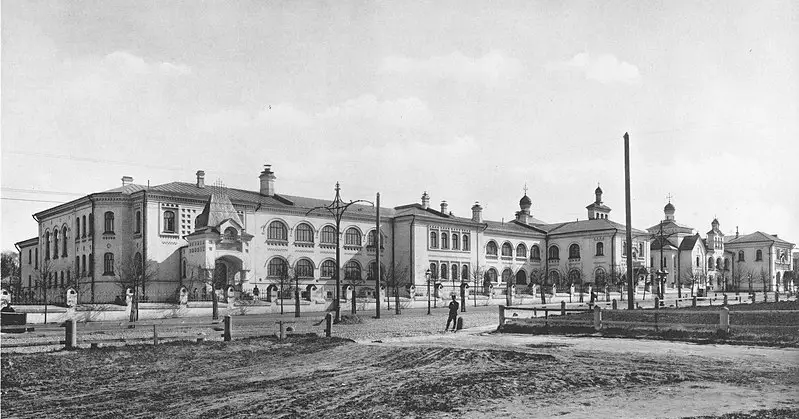
Medvednikovskaya Hospital in a photograph from the early 20th century
After 1917, it became a state hospital (city hospital No. 5); in 1992 it was transferred to the Church, but continued to receive funding from the city treasury until 2004. Branches of this hospital are open in the cities of Zhukovsky, Shuya and Pereslavl-Zalessky.
And on March 1, 2014, Patriarch Kirill surprised everyone by declaring Metropolitan Alexy the heavenly patron... of the Moscow metro.
After Alexy
Let's say a few words about Alexy's successor, Cyprian, who, according to the patriarch's plan, was supposed to “reconcile the princes (Olgerd and Dmitry of Moscow) among themselves and with the metropolitan (Alexy).” However, his appointment in Moscow was met with hostility.
Things got to the point that when Cyprian, after the death of Alexy (that is, already officially, in accordance with the will of the patriarch), became Metropolitan of Kyiv and All Rus', he was robbed, beaten and put under arrest on the orders of Dmitry. Then he in turn
betrayed Dmitry, his boyars and Mitya to the church curse, which he reported in a letter to Sergius of Radonezh, who sympathized with him:
Thus, in 1380, Dmitry went to battle with Mamai “for the holy churches and for the orthodox Christian faith,” having been given a church curse by the legitimate Metropolitan of Kyiv and All Rus' - it would be lifted only in May 1381. However, this circumstance, it seems, did not particularly bother Dmitry, just as it did not bother other Russian princes - his contemporaries (for example, the aforementioned Mikhail Alexandrovich Tverskoy and Svyatoslav Ivanovich Smolensky, excommunicated from the Church by Alexy), as well as some European kings and emperors.
Cyprian was allowed into Moscow for the first time only in 1381, at the same time he lifted the anathema from Dmitry Donskoy. But this metropolitan finally established himself in Moscow only in 1389.
Let's return to the seriously ill Alexy, who wanted to see Sergius of Radonezh as his successor, but received a categorical refusal.
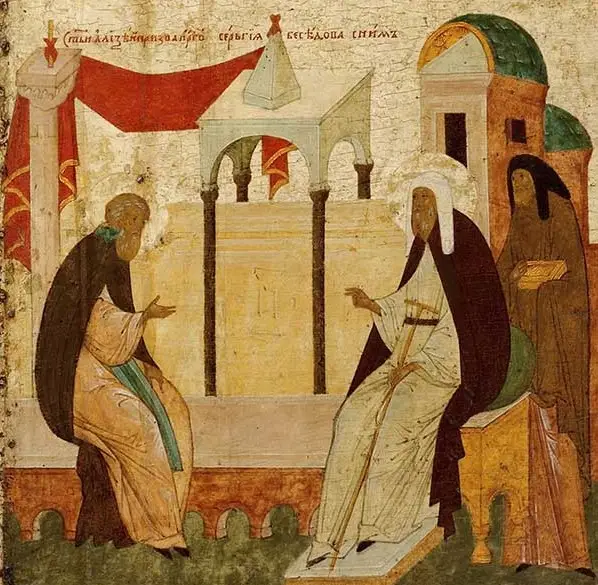
Fragment of the icon “Alexy Metropolitan with his Life”: Alexy offers Sergius of Radonezh to become Metropolitan of Moscow, behind him stands a monk with a casket containing “gold”, offered to Sergius as a pledge of priesthood
And then Dmitry decided to make his confessor and printer Mityai (Mikhail) metropolitan. Historians have the following verbal portrait of this candidate at their disposal:
They claim that Alexy Mitya never gave his blessing - he simply did not object to his candidacy. Sergius of Radonezh also had a negative attitude towards him, which irritated the prince extremely. And Mityai even threatened to ruin the Sergius Monastery.
The Suzdal bishop Dionysius spoke out even more boldly against Mityai, who decided to go to Constantinople to denounce the prince’s confessor and printer there. But Mityai died in 1379 on the way to the capital of Byzantium - already in the Bosporus Strait. Those accompanying him, without hesitation, fabricated a new letter from Dmitry, where he allegedly asked to appoint Pimen, an archimandrite from Pereyaslavl-Zalessky, as metropolitan, not Mityai.
Outraged by such arbitrariness, Ivan Petrovsky, the head of the Moscow monastic monastery, a comrade-in-arms of Sergius of Radonezh and Dionysius of Suzdal, was “chained in iron.” Dmitry did not appreciate the initiative of his ambassadors, and Pimen, who returned from Constantinople in December 1381, was arrested in Kolomna and sent into exile in Chukhloma. Those accompanying him were also subjected to repression, some were even executed.
Metropolitan Cyprian, familiar to us, was already in Moscow at that time. However, the main struggle was still ahead, the same Pimen would still be in Moscow at the metropolitan see in 1382–1384, and Dmitry would try to make Bishop Dionysius of Suzdal his “tame metropolitan”, who, however, after being confirmed in Constantinople, would not reach Moscow - will be arrested in Kyiv.
But the story of Cyprian’s ordeal is beyond the scope of this article; let us only recall that he won the final victory in 1389.
Cyprian was a hesychast (sometimes called the Orthodox humanists of his time), a polymath, and a scribe. In Rus', he became famous for his pronounced anti-Horde position and, as a supporter of the unification of all Russian lands, he was the first of the metropolitans not to go to the Horde for a label.
It was Cyprian who blessed Andrei and Dmitry Olgerdovich to participate in the Battle of Kulikovo, established the veneration of Alexander Nevsky, and on his initiative, in 1395, the icon of the Vladimir Mother of God was brought to Moscow, with which the deliverance of the Russian lands from the invasion of Tamerlane is associated.
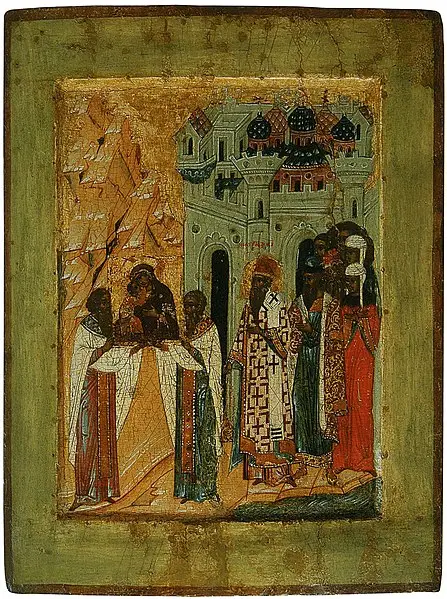
Metropolitan Cyprian in a halo in the center of the composition on the 16th century icon “The Presentation of the Vladimir Icon of the Mother of God”
Cyprian provided significant assistance to Moscow Prince Vasily I, the son of his enemy Dmitry Donskoy. It was he who agreed on his marriage to Vytautas’s only daughter Sophia - and from 1392 to 1406 there were no military clashes between Moscow and the Grand Duchy of Lithuania. He invited the icon painter Theophan the Greek and the monk Lazar the Serb, who installed the first striking clock in Rus' near the Church of the Annunciation.
Since 1487, this metropolitan has been venerated among the Moscow saints.
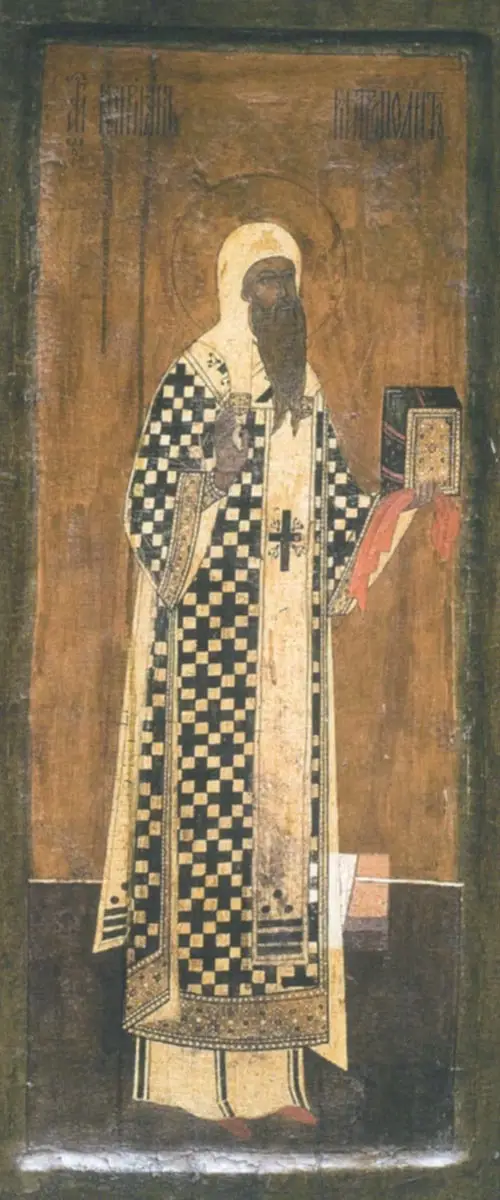
Saint Cyprian on a 17th century icon, Assumption Cathedral of the Kremlin
Information